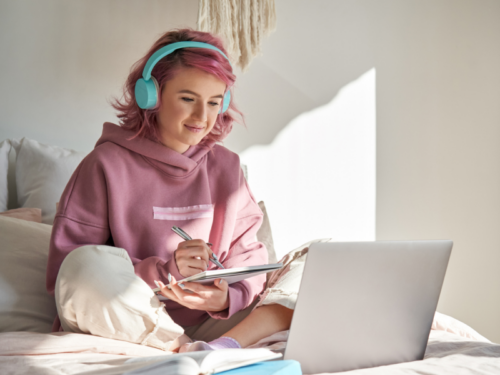
Table of Contents
Understanding Charlie Health’s Mission
Written By: Charlie Health Editorial Team

Clinically Reviewed By: Dr. Don Gasparini
September 29, 2023
4 min.
The goal of Charlie Health’s IOP is simple, albeit ambitious: to connect the world to life-saving mental health treatment. Learn more about what this means—and how we make it happen—below.
Learn more about our Clinical Review Process
Table of Contents
What Charlie Health does is self-evident: we are a virtual Intensive Outpatient Program (IOP) offering more than once-weekly therapy for young people dealing with complex mental health issues and their families.
Why we do this work is a bit more personal. Some clinicians were drawn to Charlie Health after seeing a family member struggle with high-acuity mental health issues, while others came to us after witnessing the revolving door of care in emergency rooms. Other employees chose Charlie Health because of its emphasis on access and inclusion. “After surviving a major trauma and struggling with my mental health as a teen, my life was saved by intensive mental healthcare,” said Charlie Health CEO and Co-Founder Carter Barnhart. “Making that same care accessible to everyone, everywhere, is why we started Charlie Health.”
The common thread underlying all of these motivations is a commitment to Charlie Health’s mission: to connect the world to life-saving mental health treatment. That’s what we strive for, day in and day out. Keep reading to learn more about the core pillars of Charlie Health’s mission and hear from our co-founders what this work means to them.
Connect
Connection is a motivating force at Charlie Health. From the very first time a potential client picks up the phone to talk with us, our goal is to connect them to the best treatment possible. For many people, that treatment is our IOP. If Charlie Health isn’t a fit, though, we still aim to connect young people and families to a suitable treatment option using our robust clinical network to make external referrals.
Once in treatment, we connect our clients to one another through personalized group sessions—a cornerstone of our IOP. Clients are matched not only based on their age, acuity, level, and diagnoses but also by their life experiences or background, a process that many say made all the difference in their healing. “I connected with so many people after years of isolation,” one client said about their experience with groups. “Being here has completely changed my view of myself. I’ve learned to love myself.”
The world
Our clients are teens and young adults ages 11 to 33, but our goal is for treatment to extend beyond the individual. “Treatment at Charlie Health takes into account many different factors that contribute to mental health challenges, rather than just focusing on the individual,” said Dr. Caroline Fenkel, DSW, LCSW, Charlie Health’s Chief Clinical Officer and Co-Founder. “This holistic approach helps young people heal alongside their families and communities, offering a more sustainable path toward recovery.” For many clients, treatment at Charlie Health impacts at least three other lives, including caregivers and friends.
In addition to offering family therapy, we teach clients mental health skills, including emotional regulation and communication skills, that serve them and their communities long after treatment is complete.
Download our free DBT Skills Guide today
Get 30+ pages of family mental health resources sent straight to your inbox
By entering your email you agree to receive marketing communications from Charlie Health. You can unsubscribe anytime.
Also, on a practical note, we offer services in 27 states and have our sights set on bringing care to as many communities as possible across the U.S.
Life-saving
Simply put, our treatment success is defined by the number of lives we save. Young people are in the midst of a growing mental health epidemic, and Charlie Health is giving them evidence-based treatment and tools to survive. In this regard, our most recent clinical outcomes data speak for themselves. Following treatment:
- 80% of clients reported a reduction in suicidal ideation
- 93% of clients reported improvements in symptoms associated with depression
- 91% of clients reported improvements in symptoms associated with anxiety
- 89% of clients reported improvements in self-harm
Behind each of these data points are lives saved. “Expanding access to high-quality mental health services for young people is not a choice, it is an imperative,” said Fenkel. “We are working tirelessly to provide equitable, sustainable solutions to save lives.”

Mental health treatment
Charlie Health’s IOP sits in a unique place on the mental health continuum of care. We offer more support than once-weekly therapy but less supervision than 24/7 residential or inpatient programs.
Unlike traditional talk therapy, which tends to happen once a week for 30 to 60 minutes and is all one-on-one, IOP happens more frequently and offers more kinds of support. In the case of Charlie Health, clients have 3-hour group sessions 3 days per week, plus an hour of individual and family therapy once weekly.
However, IOP involves less supervision than other intensive treatment options. In the case of Charlie Health, this means that clients who are a good fit do not have to miss out on other parts of their lives, like work or school, and can fit treatment into the rest of their responsibilities. IOP makes it possible for clients to maintain their day-to-day lives and get life-saving treatment.
If your mental health symptoms interfere with day-to-day tasks or make it hard for you to engage in life the way you’d like to, Charlie Health might be right for you. Fill out this short form to learn more about treatment and get started today.





